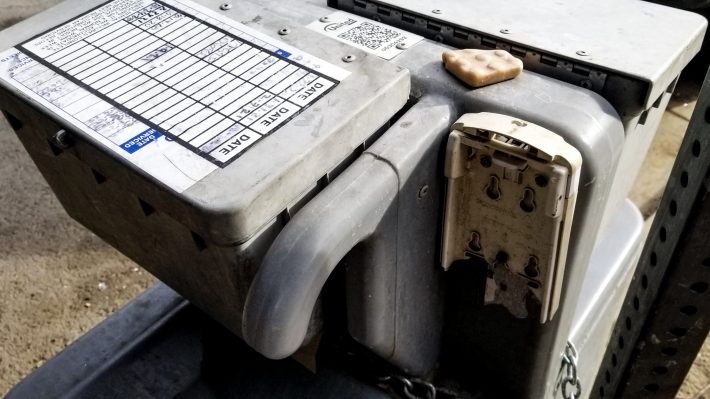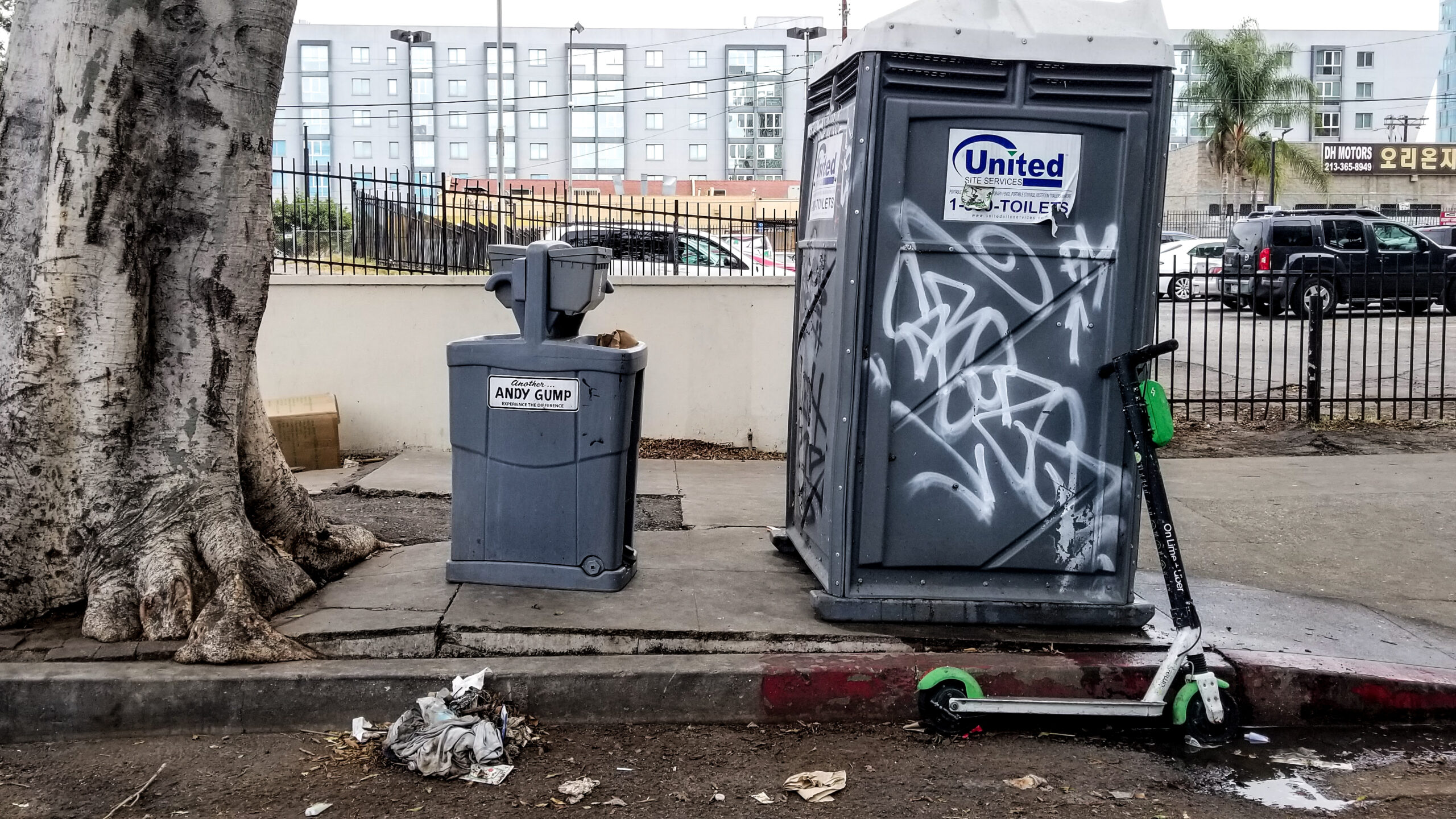At the onset of the pandemic, the City of Los Angeles distributed hundreds of handwashing stations and portable toilets to homeless encampments. Unhoused residents say the bathrooms have been helpful when they’re maintained.
However, according to city finance records obtained by L.A. TACO, funding for those hygiene stations is now running out, leaving tens of thousands of people living on the streets without a place to use the bathroom.
As of early April, the city has spent more than $1.3 million to keep dozens of hygiene stations on city sidewalks. A little less than $600,000 in approved funding remains for the program, according to the Department of General Services. And about half of the remaining funding will go towards paying past invoices.
The city spends an average of $100,000 each month to keep the units maintained and on city sidewalks. At that rate, funding for the program will likely run out early this summer unless more is approved.
The city first began rolling out hundreds of portable sinks and toilets to encampments in the spring of 2020, soon after the COVID-19 pandemic shut down service providers, libraries, and parks that unhoused people relied on for restroom access.
In August of 2021, the city invested hundreds of thousands of dollars to keep up to 150 units on city sidewalks, with more safeguards to ensure that vendors were properly servicing the sinks and toilets after an L.A. TACO investigation found that vendors were getting lots of money for work they were not completing.
The city currently rents their portable sinks and toilets from United Site Services, a porta-potty rental company that boasts more than 100,000 customers nationwide. In recent months the number of units on city sidewalks has decreased from a high of 90 in October of last year to 71 units earlier this month.
The units rent for between $9 to $36 per day. And each sink or toilet costs about $36 to service each day. There are also additional fees for replacing damaged units, delivery costs, and servicing units on the weekends and holidays.
By comparison, just one “permanent” self-flushing toilet can cost upwards of $300,000 per year to staff and service.

Although there have been issues with the temporary units being adequately maintained in the past, they come at a much lower cost to the city than “permanent toilets” that require daily staffing. And most unhoused residents, as well as their advocates, tell L.A. TACO that they’ve been helpful. They also say there is a desperate need for more bathrooms on city sidewalks.
“I am having stomach problems and I had to hold in diarrhea for more than 6 hours today,” an unhoused resident living on the westside told L.A. TACO in March. “Public toilets would be amazing.”
The portable sink and toilets that they’ve encountered near the Ballona Wetlands have been “helpful,” they said. They pointed out that buying hand sanitizer is expensive and leaves a “residue” behind.
“One of the worst sensory feelings is dirt on your hands,” they said.
Advocates tell L.A. TACO that giving unhoused residents easy access to bathrooms means that there is less human feces on the sidewalks, and that unhoused residents don’t have to rely on private businesses for restrooms.
In a statement made to L.A. TACO, LA Street Care, an abolitionist mutual aid collective organizing with the unhoused in Echo Park, Silver Lake, and neighboring communities, said, “The City of L.A.’s lack of public restrooms is a human rights and health crisis. Everyone deserves a hygienic and accessible place to do their business. We need more portable toilets and hygiene stations, not fewer.”
The group believes that removing portable sinks and toilets near encampments will result in more homeless “sweeps” and “lead to negative outcomes for unhoused Angelenos.”
“We urge Mayor Bass and the L.A. City Council to direct more funding to portable toilets and hygiene stations to combat this crisis,” the statement says.
On Tuesday, Los Angeles Mayor Karen Bass is set to unveil her first city budget proposal. A spokesperson for the mayor declined to comment on this story or specify if the mayor’s proposal will include additional funding for the temporary hygiene station program.
A spokesperson for City Council president Paul Krekorian did not respond to multiple emails.
When Mayor Karen Bass took office in December, she immediately declared a state of emergency on homelessness and made it her number one priority. The emergency declaration gives Mayor Bass a wide range of powers, including the ability to quickly secure funding and cut through red tape. Earlier this year, the city council approved $50 million in funding for Inside Safe, an initiative launched by Mayor Bass that targets specific homeless encampments with outreach and moves unhoused people into hotels (and eventually “permanent” housing).
So far, Mayor Bass’ response to the homeless crisis has largely focused on sheltering people who are living on the streets. In her first 100 days in office, the mayor’s office and a coalition of city and county partners moved more than 1,000 people living on the streets indoors through the mayor’s ‘Inside Safe’ program, according to Bass' office.
Fourteen Bathrooms For Four Million People
L.A. is in desperate need of public bathrooms. Not just for people living on the streets but for everyone. Currently there are only 14 public “permanent” bathrooms on city sidewalks. And each bathroom costs hundreds of thousands of dollars each year to maintain.
The city also offers fifteen temporary bathrooms spread across the city through their Mobile Pit Stop program. The bathrooms come with attendees who keep an eye on them during the day. But each night, they're removed from city sidewalks.
Although they’re not a perfect solution, the temporary portable sinks and toilets that were distributed to encampments during the pandemic—the same kind you find at music festivals and construction sites—have made a difference in people’s lives.
Carlos, a 43-year-old unhoused resident living in Filipinotown who was recently hospitalized for congestive heart failure, says having a portable sink and toilet near his encampment has been a “blessing.” Carlos confirms that the vendor comes out to service the graffitied porta-potty and plastic sink not far from his tent “on a regular basis.” Removing the units would “definitely” impact him and his neighbors “in a negative way.”
Carlos says giving unhoused people access to restrooms is a benefit to everybody in the community and not just for the unhoused.
“These restaurants, they won’t let anyone go in [to use the bathroom],” he says. “So yeah, people are just going to start dumping their waste [if the temporary bathrooms are removed]. If you gotta go, you gotta go.”







